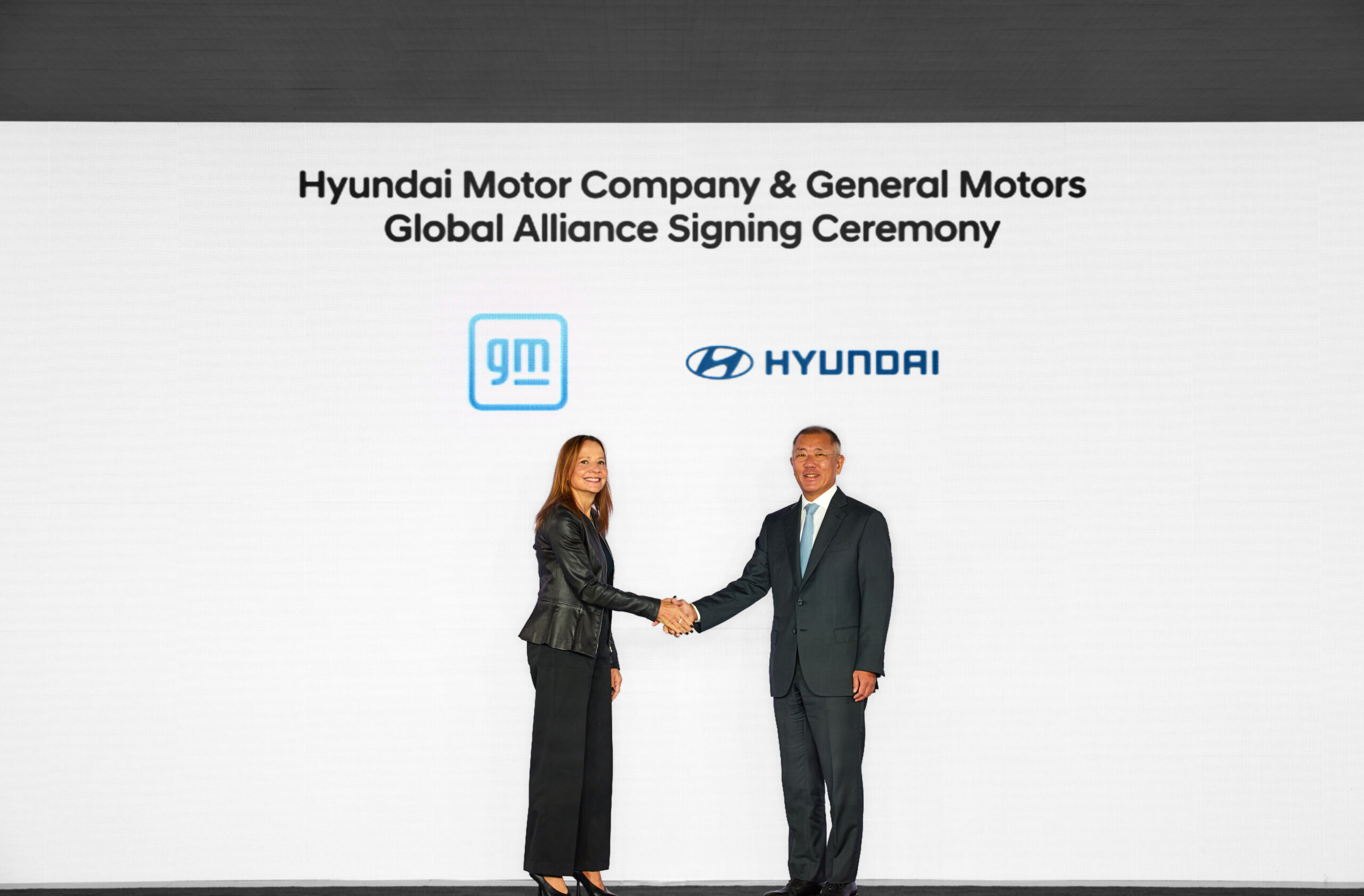

### Hyundai and GM Establish Strategic Alliance to Work on Future Vehicle Innovations
In a noteworthy advancement for the global auto sector, two of the largest manufacturers—Hyundai Motor Group (HMG) and General Motors (GM)—have revealed a strategic alliance focused on collaborating in several crucial areas, such as vehicle design, technology advancement, and supply chain management. Together, these automotive powerhouses sold a total of 13.5 million vehicles in 2023, and their partnership could lead to significant changes in the future of transportation.

*GM CEO Mary Barra (left) and Hyundai executive chair Euisun Chung (right) have reached an agreement for their companies to collaborate.*
*Image Credit: Hyundai Motor Group*
### An Alliance of Automotive Giants
GM, renowned as one of the most historic and established automakers globally, contributes a vast legacy of engineering skills and innovation. The firm has been at the forefront of numerous automotive advancements, particularly in electric and hybrid vehicle technologies. Nevertheless, GM has encountered obstacles, often stemming from corporate choices that have sometimes slowed its progress in essential areas, including the shift to electric mobility.
Conversely, Hyundai Motor Group, which encompasses brands such as Hyundai, Kia, and Genesis, has swiftly transformed from a budget brand to a worldwide leader in automotive design and innovation. Over the last 15 years, HMG has achieved remarkable progress, especially in the electric vehicle sector, where its models have earned widespread acclaim for their innovation and performance. The Korean manufacturer’s Electric Global Modular Platform (E-GMP) has been recognized as a groundbreaking advancement in the EV marketplace.
### Collaborative Focus Areas
With the formalization of their partnership, Hyundai and GM have pledged to explore numerous collaborative ventures. These consist of:
1. **Co-Development of Vehicles**: The two firms will join forces to create new passenger and commercial vehicles. This may involve both internal combustion engine (ICE) vehicles and electric vehicles (EVs), capitalizing on each automaker’s strengths.
2. **Future Powertrain Innovations**: While both companies have invested heavily in contemporary EV infrastructures—Hyundai’s E-GMP and GM’s Ultium—they have begun contemplating the subsequent generation of powertrains, which could encompass enhancements in battery technologies, hydrogen fuel cells, and other alternative energy approaches.
3. **Supply Chain Enhancement**: The global auto industry has encountered major supply chain hurdles in recent years, particularly regarding the procurement of essential raw materials such as steel and minerals needed in battery production. By collaborating on supply chain sourcing, Hyundai and GM aim to bolster their competitiveness and enhance cost efficiencies.
4. **Advancements in Technology**: Both automakers are significantly invested in pioneering automotive technologies, including systems for autonomous driving, connected vehicle solutions, and advanced safety mechanisms. By combining their resources and expertise, Hyundai and GM aspire to speed up the advancement and implementation of these technologies.
### Emphasis on Electric Mobility
One of the most thrilling aspects of this alliance is the possibility for collaboration in the electric vehicle domain. Both Hyundai and GM have made substantial commitments to electrification, with ambitious plans to convert their lineups to electric power over the next few years.
Hyundai’s E-GMP platform, supporting vehicles like the Hyundai Ioniq 5 and Kia EV6, has received accolades for its efficiency, range, and rapid-charging capabilities. Meanwhile, GM’s Ultium platform, powering vehicles like the GMC Hummer EV and Cadillac Lyriq, has been framed as a versatile and scalable answer for a broad array of electric vehicles.
By collaborating, Hyundai and GM could potentially develop even more advanced EV platforms, delivering enhanced range, performance, and cost advantages. This coalition could also assist both companies in maintaining a competitive edge in the fast-evolving EV landscape.
### Supply Chain Collaboration
Another vital focus area for the partnership is supply chain optimization. The automotive sector has been struggling with supply chain interruptions, especially in light of the COVID-19 pandemic and the persistent semiconductor deficit. Additionally, the transition to electric vehicles has introduced new challenges in acquiring raw materials essential for battery production, such as lithium, cobalt, and nickel.
Through joint efforts in supply chain sourcing, Hyundai and GM aim to alleviate these challenges and secure a consistent supply of crucial materials. This may include creating joint ventures with suppliers, investing in mining operations, or even innovating new recycling technologies to reclaim valuable materials from used batteries.
### Leadership Remarks
The leadership at both companies expressed enthusiasm regarding the partnership’s prospects.
“This partnership will empower Hyundai Motor and GM to explore opportunities to boost competitiveness in essential markets and vehicle